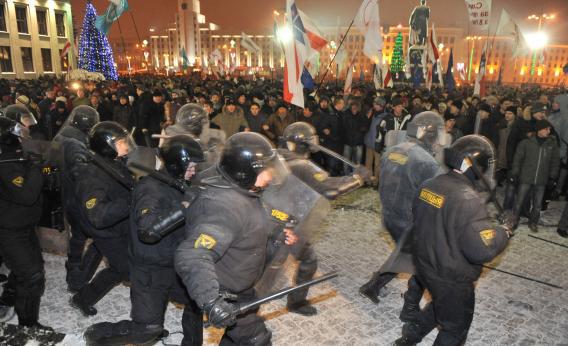Calling out hypocrisy by resorting to hypocrisy is not usually a tactic that will win you an argument. But no one seems to have told Belarus.
Known as Europe’s last dictatorship, the country has a dismal record when it comes to human rights and is fond of mass surveillance of citizens. However, that hasn’t stopped it from releasing a new report this week, Human Rights Violations in Certain Countries in 2012, which savages the United States for “unlawful interference with privacy.”
The report blasts the Obama administration’s recent renewal of the Foreign Intelligence and Surveillance Act, criticizing “the right of the President to order warrantless surveillance, and demand from companies and organizations to disclose information on citizens’ finances, contacts, public activity.” It also points the finger at “the use of GPS devices to monitor targeted citizens without a court permission” as an example of privacy violations. More broadly, it condemns how police treated Occupy protesters—illustrated with a photo of a bloody-faced activist at a demonstration in Chicago.
The stated aim of the report, which was produced by Belarus’s foreign ministry, is to draw attention to double standards in developed democracies. In addition to the United States, it features Canada, the United Kingdom, France, and Germany, as well as 20 other countries.
But it is also a clear attempt to paint Belarus in a more positive light and to justify its own abuses.
Last year, I reported on an outstanding Swedish investigation that uncovered how surveillance was used in Belarus to track down, arrest, and prosecute protesters who attended an anti-government protest rally following the 2010 Belarusian presidential election. The country’s state security agency, the KGB, had used location data records to retrospectively identify protesters who gathered in a square in the country’s capital, Minsk. According to the Swedish report, “those who criticize the regime in Belarus vanish without a trace.” Index on Censorship says the country uses “surveillance techniques which allow the state to intercept all online traffic.”
It might be convenient politics to attack other countries for “unlawful interference with privacy,” and some of the criticisms leveled in the report are valid. But ultimately it feels a bit like getting a lecture on the Geneva Conventions from a convicted war criminal. If Belarus actually wants to be taken seriously, it could start by getting its own house in order.
